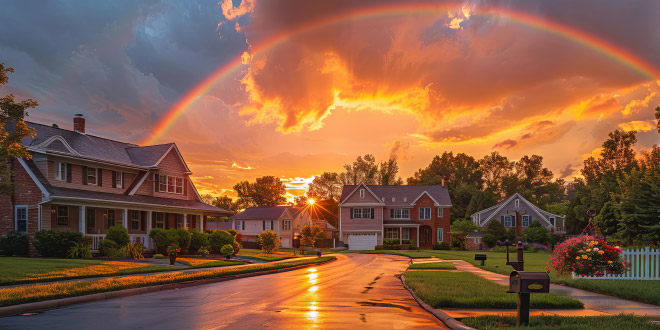Discover how a suburb house offers spacious, quiet neighborhoods and family-friendly amenities. Explore tips, styles, and real estate insights here!
Introduction
Thinking about moving to a suburb house? Whether you’re dreaming of a single-family home on a quiet street or a cozy bungalow with a lush backyard, suburban living has a unique charm. In this comprehensive guide, we’ll explore what makes a suburb house so appealing—from spacious yards and family-friendly neighborhoods to the architectural styles that define suburban America. If you’re a first-time homebuyer, a growing family, or simply looking to upgrade, read on to discover how a well-chosen suburb house can transform your lifestyle.
Table of Contents
Why Choose a Suburb House?
A suburb house can offer the perfect balance between comfort, convenience, and community. Compared to urban apartments, these detached or single-family homes often provide:
- More living space for the same—or sometimes lower—cost
- Family-friendly neighborhoods with parks, good schools, and low crime rates
- A sense of community, where neighbors know each other and local events foster camaraderie
Suburban properties come in various styles and sizes, so there’s likely a perfect fit for any family composition or life stage.
Key Features & Amenities
3.1 Outdoor Spaces: Backyard, Front Yard & More
One of the biggest perks of a suburb house is having your own outdoor area. Popular features include:
- Backyard: Ideal for hosting BBQs, letting kids run around, or setting up a vegetable garden
- Front yard: Boosts curb appeal and can serve as a welcoming introduction to your home
- Driveway & garage: Essential for convenient parking, storage, and possibly a workshop
These spaces make a home feel more spacious and allow for a variety of outdoor activities, from planting flowers to organizing weekend get-togethers.
3.2 Interior Highlights: Finished Basement, Attic & Garage
Inside a typical suburban home, you’ll often find:
- Finished basement: This extra living space can be transformed into a playroom, home theater, or guest suite
- Attic: Ideal for storage or, in some cases, converted into an additional bedroom or office
- Garage: Besides parking, a garage can store tools, bikes, or seasonal decorations
These features expand your home’s functionality and can significantly enhance property value.
3.3 Patio, Deck & Swimming Pool
If you love entertaining or simply enjoying the outdoors, a patio or deck is a must-have. Some families even opt for a swimming pool, which can:
- Boost home value in certain markets
- Provide a summer hangout for friends and neighbors
- Encourage exercise for kids and adults alike
Before installing or buying a house with a pool, consider the maintenance and safety aspects—fencing, pool covers, and local regulations all come into play.
3.4 Architectural Styles
Suburb houses come in a range of architectural styles:
- Ranch house: Single-story layout, often with an open-concept design
- Colonial house: Symmetrical façade, multiple stories, and a formal feel
- Cape Cod: A cozy style with a steep roof and central chimney
- Tudor: Distinctive half-timbering, steep rooflines, and a medieval European flair
- Victorian: Ornate detailing, wraparound porches, and decorative trims
- Craftsman: Emphasizes natural materials, front porches, and handcrafted woodwork
- Bungalow: Typically smaller, one or one-and-a-half stories, known for simplicity and charm
Your choice may depend on personal taste, budget, and the character of the neighborhood.
Location & Setting
4.1 Neighborhood Vibes: Quiet Streets & Cul-de-Sacs
A quiet street or cul-de-sac often means less through-traffic and a safer environment for kids to play. Many families prioritize these features to reduce noise and enjoy a greater sense of peace. Cul-de-sacs can also foster a tighter-knit community, as neighbors are more likely to know one another.
4.2 Close to Parks & Near Schools
Families often look for a suburb house that’s near schools and close to parks. This ensures:
- Easy commutes for children attending nearby elementary, middle, or high schools
- Proximity to green spaces for weekend outings, dog walks, or picnics
- Higher resale value if the school district is well-regarded
Before you finalize your decision, check out local school ratings, talk to other parents, or visit a prospective school to gauge its environment.
4.3 Gated Communities & Tree-Lined Streets
Some buyers prefer a gated community for added security and communal amenities like a pool or clubhouse. Tree-lined streets offer aesthetic appeal and can help keep the neighborhood cooler during hot summers. Keep in mind that gated communities may come with higher homeowners’ association fees or stricter rules, so weigh the benefits against potential costs or limitations.
Lifestyle & Activities
5.1 Family Life & Outdoor Space
For many, a suburb house represents an upgrade in lifestyle. More square footage, combined with a private yard, allows families to:
- Host gatherings like birthday parties, barbecues, or holiday celebrations
- Let kids play safely without worrying about heavy traffic
- Pursue hobbies such as gardening, woodworking, or even raising chickens in some rural suburbs
5.2 Gardening, BBQs & Playdates
A spacious yard sets the stage for a variety of outdoor activities:
- Gardening: Grow your own vegetables, cultivate flower beds, or maintain a fruit tree orchard
- BBQs: Summertime get-togethers become more fun with a dedicated grilling area and patio seating
- Playdates: Children can invite friends over to run around, play sports, or enjoy a simple game of tag
These everyday pleasures can turn a suburban property into a personal oasis of fun and relaxation.
5.3 Community Events & Suburban Living
Suburban neighborhoods often host community events like block parties, garage sales, or holiday parades. Getting involved is a great way to meet neighbors and forge lasting friendships. Some communities also organize:
- Parent-child groups for newcomers or families with young kids
- Local sports leagues (e.g., softball, soccer, or basketball) for adults and children
- Volunteer initiatives like park cleanups or food drives
Such activities create a sense of belonging and encourage a supportive, family-friendly atmosphere.
Who Buys a Suburb House?
6.1 Families, First-Time Homebuyers & Upgraders
A typical suburb house is especially appealing to:
- Families seeking more room for kids, pets, and outdoor fun
- First-time homebuyers wanting to invest in a stable environment with potential for equity growth
- Upgraders moving from a smaller city apartment or condo to a more spacious single-family home
Many see it as a chance to escape urban noise, gain privacy, and still remain within commuting distance of job hubs.
6.2 Downsizers & Empty Nesters
Not all suburban dwellers are large families. Some are empty nesters or retirees looking for a comfortable place to enjoy their golden years. Downsizing from a large home in the city to a modest, well-maintained suburban property can:
- Lower monthly costs (depending on the area)
- Provide a peaceful setting for leisurely walks or gardening
- Offer a guest room for visiting family without the burden of maintaining a massive residence
Real Estate Considerations
7.1 Homeownership & Mortgages
Purchasing a suburb house typically involves a mortgage, so it’s crucial to:
- Get pre-approved for a loan to understand your budget
- Compare interest rates from different lenders
- Budget for a down payment (often 10–20% of the purchase price)
If you’re new to homeownership, consider first-time buyer programs that offer favorable interest rates or assistance with closing costs.
7.2 Working with a Real Estate Agent
A real estate agent familiar with the local suburban market can be invaluable. They’ll:
- Schedule property tours that match your criteria (style, budget, commute)
- Negotiate on your behalf for the best possible price and terms
- Provide insights into neighborhood trends, local property taxes, and future development
Look for an agent with a track record in the suburbs you’re targeting. Ask friends or family for referrals, or read online reviews to gauge their reputation.
7.3 Home Inspection & Property Taxes
Before finalizing your purchase, always invest in a home inspection. This ensures you’re aware of any structural issues or necessary repairs. Also, be mindful of:
- Property taxes: These can vary widely, even within the same county. Higher taxes often fund better schools or public services, but confirm that it’s worth the extra cost for your lifestyle.
- HOA fees: If you’re buying in a gated community or a development with shared amenities, factor in monthly or yearly homeowners’ association fees.
Case Studies & Personal Anecdotes
- Case Study: The Mitchell Family
- Scenario: After years in a city condo, the Mitchells wanted a bigger yard for their two dogs and a safer neighborhood for their toddler. They found a Cape Cod-style suburb house on a tree-lined street with a friendly community. While the commute was longer, they felt it was worth it for the fresh air and extra space.
- Outcome: A year later, they’ve hosted multiple BBQs, joined a local parent group, and can’t imagine going back to urban life.
- My Personal Experience
- Anecdote: I grew up in a ranch house on a quiet suburban cul-de-sac. Some of my favorite childhood memories involve playing catch in the front yard and racing bikes with the neighbor kids. Even as an adult, I realize how the layout—single-story, open design—made everyday living more convenient for my parents and grandparents alike.
Expert Quotes & Insights
“When considering a suburb house, always assess your future needs. Are you planning more kids? Will you work from home? Suburban properties can adapt, but it’s wise to plan ahead.”
— Lindsey Carter, Certified Residential Specialist
“Property taxes in some suburban areas can be high, but the trade-off is often excellent public schools, well-maintained roads, and robust community services.”
— James Whitmore, Real Estate Economist
Frequently Asked Questions (FAQs)
Q1: How do I know if a suburb house is right for me?
- Answer: Think about your lifestyle—do you want outdoor space, a quieter neighborhood, and more room? If so, suburban living might be a perfect match. But consider commute times and property taxes as well.
Q2: Are all suburb houses single-family homes?
- Answer: Many are, but some suburbs also offer townhomes, condos, and even multi-family properties. Single-family homes dominate, but it’s not your only choice.
Q3: What’s the best architectural style for a family?
- Answer: It varies by preference. Ranch houses are great for accessibility, while colonials often have multiple floors for separation of living areas. Focus on layout rather than just aesthetics.
Q4: Do suburb houses hold their value better than city condos?
- Answer: Market trends fluctuate, but well-located suburban homes generally appreciate steadily, especially in areas with good schools and low crime rates. Always research local data.
Q5: How do I handle yard maintenance if I’m not used to it?
- Answer: Start small—maybe just a simple lawn or flower bed. You can also hire lawn care services. Over time, you’ll learn or decide how much upkeep you want to manage personally.
Q6: Is it harder to find a mortgage for a suburb house than a city apartment?
- Answer: Not necessarily. Lenders focus on your credit score, income, and debt-to-income ratio. The property’s location can influence interest rates if you’re in a high-cost or specialized market, but in general, the process is similar.
Q7: Are home inspections different for suburban properties?
- Answer: They’re usually more focused on external features like roofs, drainage, or septic systems. But the core idea remains the same—uncover potential issues before buying.
Q8: What about property taxes in suburban areas?
- Answer: They can be higher, especially in regions with top-notch schools or robust local services. Always factor these into your monthly budget and ask for recent tax records to avoid surprises.
Key Takeaways
- A suburb house typically offers more space, privacy, and outdoor areas compared to city living.
- Popular amenities include backyards, garages, finished basements, and even swimming pools.
- Architectural styles vary widely—ranch, colonial, cape cod, craftsman, and more—catering to different tastes.
- Location matters: Quiet streets, proximity to parks, and good schools can boost quality of life and property value.
- Lifestyle perks include community events, gardening, and safe neighborhoods for families, first-time homebuyers, and empty nesters alike.
- Keep an eye on property taxes, HOA fees, and commute times. Thorough research and a trusted real estate agent can make the process smoother.
Conclusion & Call to Action
Choosing a suburb house is more than just picking a location—it’s about finding a place where your family can grow, your weekends can be spent outdoors, and your personal space finally feels truly yours. From spacious backyards to community events that foster close-knit bonds, suburban living can offer a lifestyle that’s both comfortable and fulfilling.
Ready to take the next step?
- Explore Local Listings: Check online real estate platforms or consult with a specialized real estate agent who knows suburban markets.
- Visit Neighborhoods: Spend weekends driving around potential areas, talking to residents, and sampling local shops or parks.
- Stay Informed: Subscribe to our newsletter for more articles on homeownership, mortgages, and insider tips on finding the perfect property.
By focusing on what matters—be it architectural style, yard size, or school district—you’ll be one step closer to securing the suburb house that feels like home. If you’ve got experiences or questions, drop them in the comments below—we’d love to hear your story!
 NexMove Home & Investment Guide Find Your Perfect Property, Invest Wisely.
NexMove Home & Investment Guide Find Your Perfect Property, Invest Wisely.





